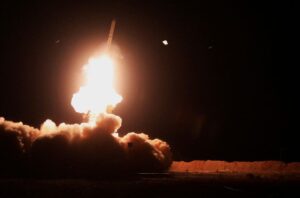Market Turbulence Amid Escalating Middle East Conflict
As financial markets reopened this weekend, uncertainty loomed large due to escalating tensions in the Middle East. Crude oil prices initially surged nearly 4%, a clear indicator of the potential fallout from the ongoing Israel-Iran skirmishes. Meanwhile, U.S. stock futures opened slightly lower, signaling investor jitters.
Escalation of Hostilities
The conflict has intensified, with Israel and Iran accusing each other of launching further strikes that resulted in civilian casualties. Yemen’s Iran-aligned Houthis also entered the fray, complicating the geopolitical landscape. The images emerging from Tehran—particularly those showing a blazing fuel depot in the wake of Israeli attacks on Iranian oil assets—raise alarms about broader economic implications.
Kathryn Rooney Vera, chief market strategist at StoneX Group, emphasized that "the market is very headline-driven and short-term focused," which could lead to pronounced volatility in the near term.
Oil Prices and Economic Implications
Brent crude futures shot up to nearly $76.94 before settling at $76.37, a continuation of the 7% rise seen on Friday due to the initial exchanges of military fire. Eric Beyrich from Sound Income Strategies noted, "although the Israelis have targeted Iran’s natural gas processing facilities, which affect power generation, the impact on oil exports remains minimal—for now."
However, the undertones of these developments extend far beyond mere price fluctuations. A significant risk looms in the form of potential supply shortages, particularly should the Strait of Hormuz—an essential artery for global oil trade—become compromised. Rooney Vera cautioned that any blockade in this region could exacerbate inflationary pressures, already a concern as central banks navigate the dual challenges of trade tariffs and a volatile market.
Investor Sentiment and Stock Market Reaction
Investor sentiment appears skittish, particularly within the S&P 500, which has recently stalled after a remarkable 20% rally from its lows earlier this year. Props to market resilience seem to be wavering, with futures indicating a drop of 0.2% as the new week dawns.
Jack Ablin, chief investment officer at Cresset Capital, remarked that investors might take a breath of relief, noting that the capacity of Iranian military capabilities may not be as formidable as previously feared. However, the prevailing sentiment underscores that "it’s more of an oil story than an equity story at this point," as stocks seem to hang in the balance.
To gauge market volatility, the Cboe Volatility Index, often referred to as the "fear index," closed at 20.82 on Friday—its highest in three weeks—indicating a significant level of investor apprehension about future market stability.
Conclusion: The Road Ahead
Navigating these tumultuous waters will require keen insight and strategic foresight. The situation in the Middle East is not merely a political concern; it serves as a barometer for global financial health. As tensions persist, investors must stay informed and agile, prepared to respond to the dynamic interplay between geopolitical events and market movements.
Investing wisely means keeping a close watch on headlines and understanding their broader implications on markets. At Extreme Investor Network, we empower our members with the insights and analysis necessary to thrive in such uncertain times. Stay engaged, and stay informed.

